Zhongjian Qiao
Cross-Domain Offline Policy Adaptation via Selective Transition Correction
Feb 05, 2026Abstract:It remains a critical challenge to adapt policies across domains with mismatched dynamics in reinforcement learning (RL). In this paper, we study cross-domain offline RL, where an offline dataset from another similar source domain can be accessed to enhance policy learning upon a target domain dataset. Directly merging the two datasets may lead to suboptimal performance due to potential dynamics mismatches. Existing approaches typically mitigate this issue through source domain transition filtering or reward modification, which, however, may lead to insufficient exploitation of the valuable source domain data. Instead, we propose to modify the source domain data into the target domain data. To that end, we leverage an inverse policy model and a reward model to correct the actions and rewards of source transitions, explicitly achieving alignment with the target dynamics. Since limited data may result in inaccurate model training, we further employ a forward dynamics model to retain corrected samples that better match the target dynamics than the original transitions. Consequently, we propose the Selective Transition Correction (STC) algorithm, which enables reliable usage of source domain data for policy adaptation. Experiments on various environments with dynamics shifts demonstrate that STC achieves superior performance against existing baselines.
Sample-Efficient Policy Constraint Offline Deep Reinforcement Learning based on Sample Filtering
Dec 23, 2025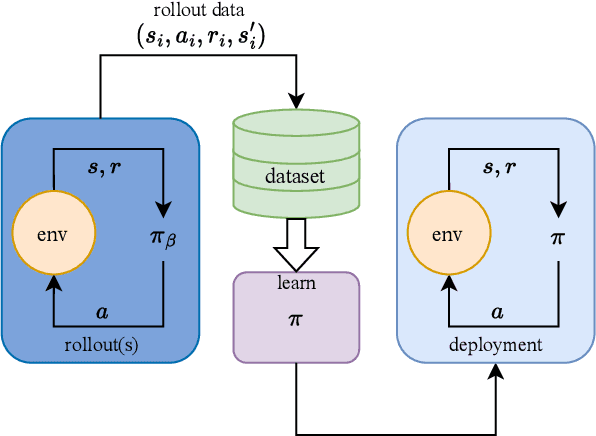

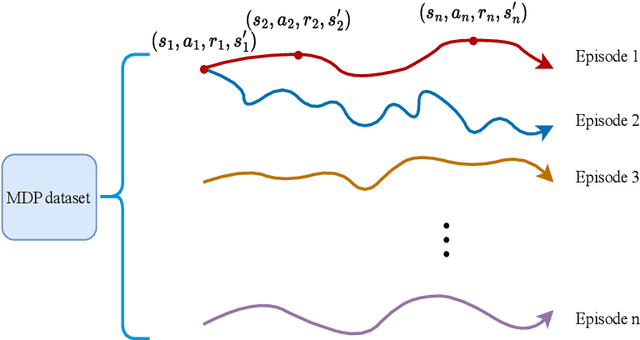
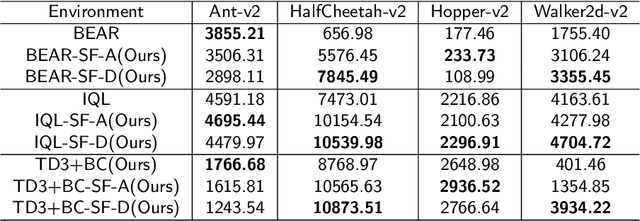
Abstract:Offline reinforcement learning (RL) aims to learn a policy that maximizes the expected return using a given static dataset of transitions. However, offline RL faces the distribution shift problem. The policy constraint offline RL method is proposed to solve the distribution shift problem. During the policy constraint offline RL training, it is important to ensure the difference between the learned policy and behavior policy within a given threshold. Thus, the learned policy heavily relies on the quality of the behavior policy. However, a problem exists in existing policy constraint methods: if the dataset contains many low-reward transitions, the learned will be contained with a suboptimal reference policy, leading to slow learning speed, low sample efficiency, and inferior performances. This paper shows that the sampling method in policy constraint offline RL that uses all the transitions in the dataset can be improved. A simple but efficient sample filtering method is proposed to improve the sample efficiency and the final performance. First, we evaluate the score of the transitions by average reward and average discounted reward of episodes in the dataset and extract the transition samples of high scores. Second, the high-score transition samples are used to train the offline RL algorithms. We verify the proposed method in a series of offline RL algorithms and benchmark tasks. Experimental results show that the proposed method outperforms baselines.
TCPO: Thought-Centric Preference Optimization for Effective Embodied Decision-making
Sep 10, 2025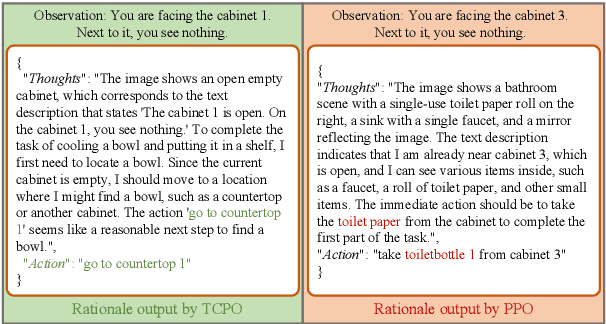

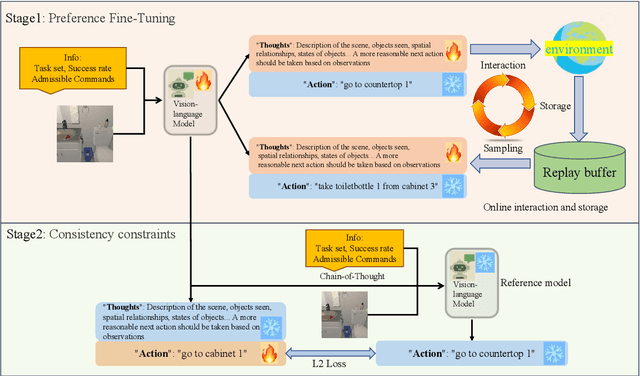

Abstract:Using effective generalization capabilities of vision language models (VLMs) in context-specific dynamic tasks for embodied artificial intelligence remains a significant challenge. Although supervised fine-tuned models can better align with the real physical world, they still exhibit sluggish responses and hallucination issues in dynamically changing environments, necessitating further alignment. Existing post-SFT methods, reliant on reinforcement learning and chain-of-thought (CoT) approaches, are constrained by sparse rewards and action-only optimization, resulting in low sample efficiency, poor consistency, and model degradation. To address these issues, this paper proposes Thought-Centric Preference Optimization (TCPO) for effective embodied decision-making. Specifically, TCPO introduces a stepwise preference-based optimization approach, transforming sparse reward signals into richer step sample pairs. It emphasizes the alignment of the model's intermediate reasoning process, mitigating the problem of model degradation. Moreover, by incorporating Action Policy Consistency Constraint (APC), it further imposes consistency constraints on the model output. Experiments in the ALFWorld environment demonstrate an average success rate of 26.67%, achieving a 6% improvement over RL4VLM and validating the effectiveness of our approach in mitigating model degradation after fine-tuning. These results highlight the potential of integrating preference-based learning techniques with CoT processes to enhance the decision-making capabilities of vision-language models in embodied agents.
SUMO: Search-Based Uncertainty Estimation for Model-Based Offline Reinforcement Learning
Aug 23, 2024
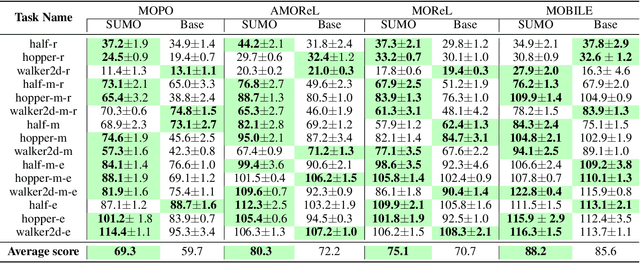
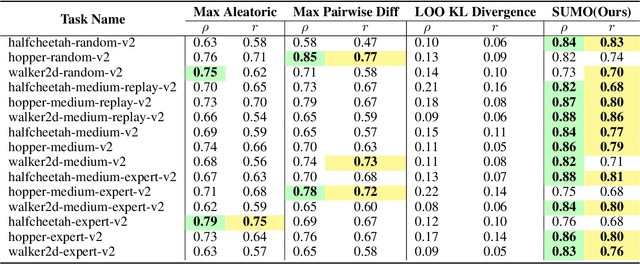
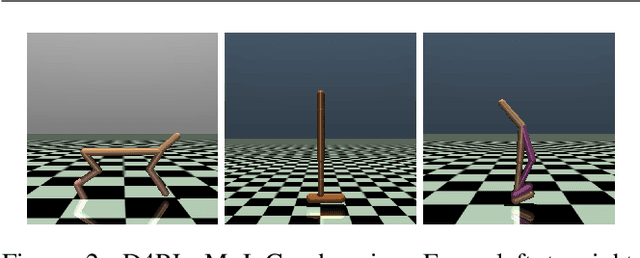
Abstract:The performance of offline reinforcement learning (RL) suffers from the limited size and quality of static datasets. Model-based offline RL addresses this issue by generating synthetic samples through a dynamics model to enhance overall performance. To evaluate the reliability of the generated samples, uncertainty estimation methods are often employed. However, model ensemble, the most commonly used uncertainty estimation method, is not always the best choice. In this paper, we propose a \textbf{S}earch-based \textbf{U}ncertainty estimation method for \textbf{M}odel-based \textbf{O}ffline RL (SUMO) as an alternative. SUMO characterizes the uncertainty of synthetic samples by measuring their cross entropy against the in-distribution dataset samples, and uses an efficient search-based method for implementation. In this way, SUMO can achieve trustworthy uncertainty estimation. We integrate SUMO into several model-based offline RL algorithms including MOPO and Adapted MOReL (AMOReL), and provide theoretical analysis for them. Extensive experimental results on D4RL datasets demonstrate that SUMO can provide more accurate uncertainty estimation and boost the performance of base algorithms. These indicate that SUMO could be a better uncertainty estimator for model-based offline RL when used in either reward penalty or trajectory truncation. Our code is available and will be open-source for further research and development.
The primacy bias in Model-based RL
Oct 23, 2023Abstract:The primacy bias in deep reinforcement learning (DRL), which refers to the agent's tendency to overfit early data and lose the ability to learn from new data, can significantly decrease the performance of DRL algorithms. Previous studies have shown that employing simple techniques, such as resetting the agent's parameters, can substantially alleviate the primacy bias. However, we observe that resetting the agent's parameters harms its performance in the context of model-based reinforcement learning (MBRL). In fact, on further investigation, we find that the primacy bias in MBRL differs from that in model-free RL. In this work, we focus on investigating the primacy bias in MBRL and propose world model resetting, which works in MBRL. We apply our method to two different MBRL algorithms, MBPO and DreamerV2. We validate the effectiveness of our method on multiple continuous control tasks on MuJoCo and DeepMind Control Suite, as well as discrete control tasks on Atari 100k benchmark. The results show that world model resetting can significantly alleviate the primacy bias in model-based setting and improve algorithm's performance. We also give a guide on how to perform world model resetting effectively.
 Add to Chrome
Add to Chrome Add to Firefox
Add to Firefox Add to Edge
Add to Edge